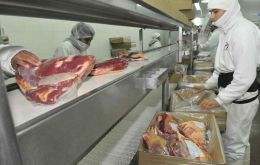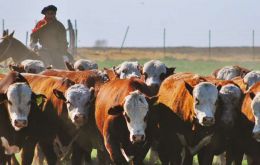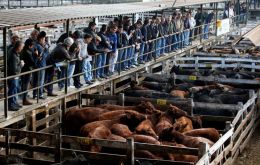MercoPress. South Atlantic News Agency
Tag: beef exports
-
Thursday, February 10th 2022 - 09:22 UTC
Excellent prospects for Mercosur beef exports, except Argentina

The Argentine beef industry is optimistic about world meat production and global demand this year, with China again playing a leading market role. A report issued by Argentina's Rosario Stock Exchange (BCR) and the Mercado Ganadero Department (Rosgan), world beef production will reach 58 million tons, representing a 1% increase over 2021.
-
Tuesday, October 12th 2021 - 08:48 UTC
Uruguayan authorities halt second beef shipment to China which failed to meet quality standards

Uruguay's Agriculture and Livestock Minister Fernando Mattos explained during the weekend that in addition to a batch of Uruguayan beef turned down by China at the port of destination for containing excessive amounts of fat, a similar case had been detected in the port of Montevideo, which was ready to be shipped.
-
Monday, April 19th 2021 - 10:24 UTC
Argentine officials rule out banning beef exports or setting quotas

Argentine beef industry sources quoted by local media Sunday announced the administration of President Alberto Fernández was not planning to ban beef exports or set up quotas, after announcing last week a series of measures to detect under-invoicing.
-
Friday, April 16th 2021 - 08:45 UTC
Argentina reinstates beef exports registry

Argentina's government Thursday created a registry of beef exporters among other measures to curb under-invoicing, which authorities fear has been going on for a while now.
-
Friday, May 8th 2020 - 09:28 UTC
Brazil expects beef exports to set a new record in 2020 in volume and value

Brazilian beef exports in 2020 will likely set a new record in terms of volume and value despite the novel coronavirus pandemic, Antônio Camardelli, president of beef group Abiec, said on Thursday.
-
Tuesday, April 7th 2020 - 08:59 UTC
Argentina beef exports to the EU and China plunge

Market reports suggest that Argentine beef shipments to the European Union have reduced to almost zero amid the global coronavirus pandemic. Sales to China, the main buyer, have dropped below 2019 levels.
-
Monday, February 24th 2020 - 06:25 UTC
Argentine beef exports to China fall almost a third in January plus price disputes

Argentine beef exports to its top buyer China fell almost a third in January due to a price dispute with Chinese importers and the effects of a coronavirus outbreak, the head of the country's meat export chamber revealed.
-
Wednesday, May 30th 2018 - 08:43 UTC
Argentina set to expand fresh beef exports to Japan and China

Argentina is set to expand fresh beef exports to Asia, with Japan and China having already approved import deals, the country's agriculture minister said. Luis Miguel Etchevehere in Tokyo said that Argentina has signed a deal with the Japanese government under which Tokyo will authorize imports of fresh beef from Argentina by late July. His country has also inked a beef export agreement with Beijing.
-
Thursday, January 18th 2018 - 09:36 UTC
Brazil willing to admit US ethanol, if US opens market to fresh beef exports

Brazil is studying the removal of a 20% tariff on ethanol imports from the United States, Agriculture Minister Blairo Maggi said on Wednesday, in a decision that could depend on Washington lifting a ban on fresh beef exports from Brazil. Last year, Brazil imposed a 20% tax on ethanol imported from the U.S. that exceeds a 600 million liter annual quota to protect local producers as imports spiked.
